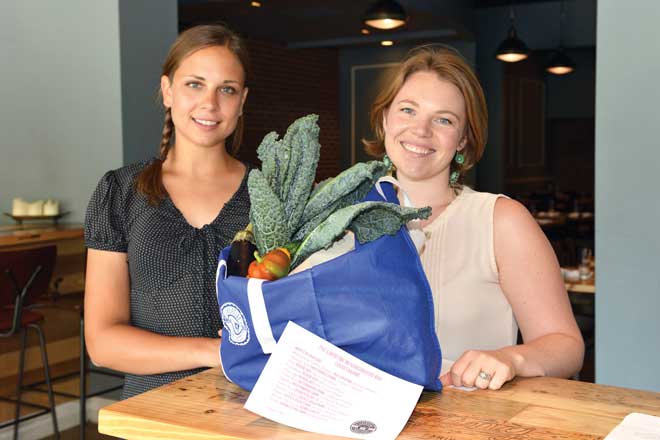You can experience ‘farm to table’ dining at many restaurants around town. But if you want to practice it at home, CSAs make it easy. Community-Supported Agriculture programs connect local farmers to city dwellers by offering home deliveries of whatever produce/meats are fresh-from-the-farm that week.
The Libertine Neighborhood Bag is one such program that operates through the Clayton restaurant’s established relationship with farms in the region. Victoria Weber, general manager at The Libertine, is one of the masterminds behind the restaurant’s CSA, launched this past spring. “My husband (Nate Weber, also general manager) and I worked on an organic farm in Oregon before we moved here, and we wanted to incorporate our love for agriculture through the restaurant,” she says. “We have so many connections to all these local farms and producers and we thought, ‘How great would it be to extend that back to the community?’”
All of the roughly 20 participating farms are located within 100 miles of St. Louis, except for one in Kentucky. “We don’t know what we’re going to get until the day it arrives, and then we just portion out all the produce and meat to the appropriate tote bags,” Weber explains. The program strives to make it convenient for each shareholder, with four different options—omnivore, vegan, vegetarian and paleo—every nine-week, ‘season.’ Prices vary from $45 to $55 a week, depending on the selection, Weber says. Since the restaurant takes care of gathering the goods, which include items like vegetables, cheese, eggs and meat, from local farms, all customers have to do is pick up their bags every Tuesday at the restaurant. “It’s an easy opportunity to bring fresh, healthy ingredients home,” Weber says. “People can just swing by after work to pick up their groceries for the week.”
Each bag also includes recipes from chef Josh Galliano correlating with what’s inside, a specialty item from the restaurant’s kitchen, and a print-out that explains the origin of each item. The demand has been huge, Weber says, evident by the current wait list. “We started with 50 shareholders in the spring and bumped it up to 65 for the summer, and that’s about where we want to stay.”
Leslie Moore founded Farmer Girl Meats from that same love of agriculture and land preservation. Her company, from its central hub in Warrenton, Mo., provides grass-fed beef and pasture-raised pork, lamb and chicken to customers through home delivery, by mail or at various pick-up sites. The company is a collaboration between three small farms on the Missouri-Kansas border; one is her family’s farm, where Moore was raised and her parents still live. “I started this program first and foremost because I’m really passionate about the product,” she says. “It’s what I grew up eating and what I feed my family.” When people started inquiring about how they, too, could get the meat, which is low in fat and filled with omega-3s and other healthy nutrients, Moore says starting the company was a natural progression. “The mission became getting this great meat that promotes good health into the city and onto more plates,” she says.
Farmer Girl Meats officially launched in July 2012, and the response has been overwhelming. “Since it’s a natural production system, we need to let the land and animals lead our supply,” Moore explains. Customers can sign up online for a onetime delivery or a recurring subscription and can regulate delivery frequency and selection. “The Farmer Girl Box is our most popular option,” she says. “We select what goes in, so it’s representative of what comes off the farm and is truly a farm-to-table experience.” A blog, weekly newsletter and informational articles serve as resources for customers on topics such as cooking the various meats (as well as the benefits of eating them) and farm practices.
Her early exposure as a child to healthy eating and sustainable food practices has driven Moore’s passion for helping others understand the process of getting food to the table. “The basis for all of this is about bringing farmers together to revitalize the land and find ways to help it be as productive as possible,” she says.
Photo: Bill Barrett
Pictured: Ann Johnson and Victoria Weber of The Libertine
